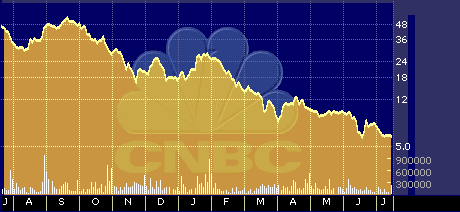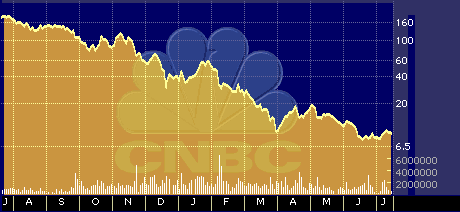
IPO Fever Continues with 724 Solutions
IPO Fever Continues with 724 Solutions
by Hal Plotkin
Silicon Valley Correspondent
In the tradition of many recent IPOs, 724 Solutions Inc.’s {SVNX} has made an impressive debut, helped by continuing IPO fever and the company’s strong ties to the banking industry.
Shares opened at 73, after the company earlier Friday priced its 6 million share offering at 26 a share, above its expected range of 20 to 22.

724 Solutions Post-IPO Stock-Performance Chart
“724 has some very high-profile customers and investors,” says George Barto, senior analyst at the Gartner Group, based in New York “They’re definitely going to make it succeed.”
Toronto-based 724 Solutions provides software that enables mobile Internet-based banking services using wireless-communications networks. Major pre-IPO investors in 724 Solutions include Citigroup Inc. {C}, which owns 21.8 percent of the firm; Bank of America Corp. {BAC}, which owns 10.9 percent; and Bank of Montreal, which owns 11.7 percent. Additionally, Wells Fargo & Co. {WFC} has a deal that allows it to start using the firm’s services later this year.
“Being close to the banks is something that will prove very beneficial,” says Mark Quigley, an analyst with the Yankee Group, based in Brookville, Ontario. “Establishing a reputation in association with the banks will be an advantage as they transfer the technology to other vertical markets.”
Those additional vertical markets include areas such as insurance, brokerage and other related e-commerce opportunities that are drawing more attention from banks as a result of recent industry deregulation in the United States, Quigley says.
724 Solutions could continue to rise Friday — and beyond, if you look at competitor Aether Systems Inc.’s {AETH} post-IPO stock performance.
Aether Systems went public on Oct. 20, with shares initially priced at 16. The stock has been changing hands more recently at about 135.

Aether Systems Post-IPO Stock-Performance Chart
Analysts say both firms, along with privately held W-Trade Technologies, are benefiting from market positioning that places them squarely at the intersection of two exploding arenas, wireless communications and Internet infrastructure.
“There are basically three firms that are known to everyone in the financial services sector,” says Jim Laird, an analyst with the Yankee Group, based in Boston. “If you go to a conference, those are the three names you see.”
Analysts are generally very optimistic about the future of the mobile-wireless-banking and financial services markets. Many of them, however, also stress the fact that the current market for such services remains quite small. As of just 14 months ago, for example, fewer than 1.6 million U.S. households owned the digital devices or alphanumeric pagers required to use mobile-banking services, according to the Yankee Group.
There may, however, be as many as 828 million digital-wireless subscribers by 2003, according to an estimate by Dataquest, based in San Jose, Calif.
The ranks of wireless-device users are expected to explode, driven in large measure by economics that are exemplified by the substantial savings banks derive whenever their customers do business over the Internet.
Netro Soars on Broadband-Wireless Hopes
On average, it costs a bank $1.25 to manually process a transaction when a customer visits a branch, $1 on the telephone, 38 cents when the business is done at an ATM and just one cent when it’s done over the Internet, according to Zona Research, based in Redwood City, Calif.
“If you’re cutting cost by a factor of 100, there is room for capturing a great deal of savings,” says Jack Staff, senior research analyst at Zona Research.
Barto says he thinks at least some of those savings will eventually be used by smart marketing executives at banks to offer free or discounted wireless services to their best customers in exchange for deposits, in lieu of the more traditional toaster or set of golf clubs.
“Right now, wireless services cost too much for most people,” Barto says. “But when banks or other financial institutions start rolling out free services because they want our business, that’s when you’ll see this really take off.”
Barto says he is fully convinced mobile banking will catch on in a very big way. He says a variety of consumer-opinion surveys has shown, for example, that consumers who bank online greatly appreciate the ability to take care of business anytime they want. “Wireless adds the anywhere angle to that,” he says. “Now they’ll be able to do their banking anytime, anywhere. It’s a big selling point.”
724 Solutions is test-marketing its wireless-banking services in Canada, with additional rollouts in locations where the firm’s other key investors have a strong market presence. 724 doesn’t have an exclusive deal with its investor banks, all of whom remain free to use technology from competing vendors. Analysts, however, say that when push comes to shove, it is unlikely that the major banks who own large chunks of 724 Solutions will be eager to take their business elsewhere.
724 Solutions posted a loss of $6.2 million on revenue of $2.1 million for the nine months ended Sept. 30, as compared with a loss of $333,000 on revenue of $1.2 million for the same period a year earlier.


